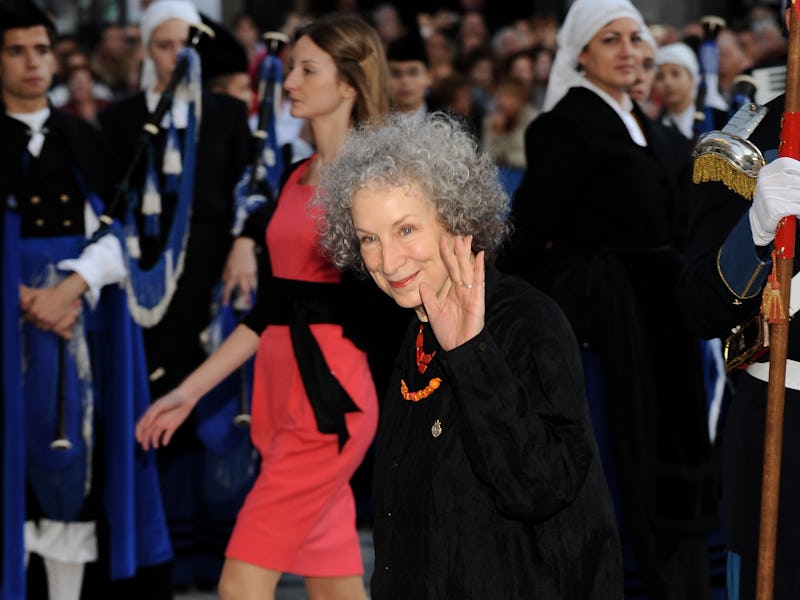Why It's Never Been a Better Time for Margaret Atwood to Light Up TV
'The Handmaid's Tale' and 'Alias Grace' are finally coming to TV at the perfect time.

This upcoming year, Margaret Atwood will dominate TV with sharp, edgy stories. There will be an adaptation of The Handmaid’s Tale on Hulu starring Elisabeth Moss while Alias Grace, starring Anna Paquin, is coming to Netflix. Hopefully the MaddAddam HBO series will finally get off the ground too. Because these particular novels have been around for over 20 years — The Handmaid’s Tale was published in 1985; Alias Grace in 1996 — it might seem strange that they’re just now landing on the small screen. But there has never been a more fitting time for Atwood’s work — and not just because it’s the era of Peak TV, either. Rather, it’s because Atwood is an expert in two key areas: human folly and feminism.
There is a reason her most famous quote is, “Men are afraid that women will laugh at them. Women are afraid that men will kill them.” Her work deals with the female experience on all levels, whether it’s systematic oppression in a chillingly possible religious/militaristic society like The Handmaid’s Tale or the quieter, domestic oppression of an unhappy marriage Iris faces in The Blind Assassin. Even the cold, impulsive Charmaine in the gloriously bonkers The Heart Goes Last feels trapped and acts accordingly.
Feminism today is the most visible it’s been since the suffragette movement. This isn’t to discount feminism in the ‘60s and ‘70s, but at the time it was mostly resigned to specific circles. It’s never been more of a hot-button topic in mainstream discussions than it is right now, whether it’s celebrities regularly being asked “Are you a feminist?” in interviews (and the dozens of thinkpieces that pop up analyzing their answers) or, you know, the first chance America has had of actually having a woman in the Oval Office.
But just like how Obama’s presidential victory hardly stopped racism (if anything, it amped up the national conversation around racism as instances of police brutality against unarmed black teens happens more frequently), if Hillary wins, it hardly means sexism is over. It means, in many ways, that this new level of conversation is just getting started, and there are sure to be some ugly bumps along the way.
That’s why it’s never been a more perfect time to have Margaret Atwood’s work on our television screens. It’s the job of entertainment to respond to societal ills and parse them out in a more entertaining way. Television is currently our most relevant method. The Handmaid’s Tale involves a government that literally polices and controls women’s bodies while Alias Grace centers around a woman whose trustworthiness is constantly in question. Both are stories that feel particularly resonant now, and these stories couldn’t be coming to our screens at a more relevant time if Atwood had planned it herself.
Margaret Atwood is not a suit-wearing TV exec nor is she a young, edgy creative who started with a web series and is destined to be The Next Big Thing. She’s a deceptively angelic looking woman in her 70s with a serene smile who’s reigned from her literary throne for many years now. It’s about time her voice came to television. Now bring on an adaptation of The Blind Assassin.